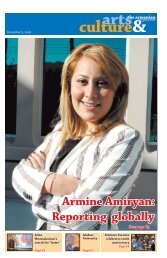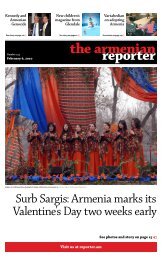And for this we are thankful.... - Armenian Reporter
And for this we are thankful.... - Armenian Reporter
And for this we are thankful.... - Armenian Reporter
Create successful ePaper yourself
Turn your PDF publications into a flip-book with our unique Google optimized e-Paper software.
18 The <strong>Armenian</strong> <strong>Reporter</strong> | November 22, 2008ArmeniaHranush Hakobyan: “The Diaspora Ministry is thehome of every <strong>Armenian</strong>”An interview withthe new ministerby Vincent LimaYEREVAN – When I made myfirst trip to Armenia 16 years ago,I stayed at the Erebuni Hotel offRepublic Squ<strong>are</strong> <strong>for</strong> three <strong>we</strong>eks.It was a <strong>we</strong>ll-worn facility, and atthe time it accommodated guestson the fourth and fifth floors only.The other floors <strong>we</strong>re occupied byrefugees from Azerbaijan.On October 21, accompanied bymy colleague Maria Titizian, I returnedto the hotel, now all freshand shiny after a major renovationjob, right back to the fifth floor. Wehad an appointment with HranushHakobyan, the head of thenewly <strong>for</strong>med Diaspora Ministry ofArmenia. Her large office was filledwith floral arrangements – tokensof affection from her friends on theoccasion of her appointment.As <strong>we</strong> sat there, sipping bitter<strong>Armenian</strong> coffee, I thought aboutthe refugees who had lived in thatbuilding. Some of them had becomeintegrated into the local society.Many of them had movedabroad. Even as Maria and I had,each of us, moved to Armenia withour families, hundreds of thousandsof <strong>Armenian</strong>s had movedaway from Armenia. Not only hadArmenia changed over the last twodecades; so too had the diaspora,much expanded by <strong>this</strong> huge influx.Or perhaps there <strong>we</strong>re multiple <strong>Armenian</strong>diasporas, and <strong>Armenian</strong>emigrants from Armenia and Azerbaijan<strong>we</strong>re the ne<strong>we</strong>st diaspora.Was the Diaspora Ministry an ef<strong>for</strong>tto reach out to that new, notyet-organizeddiaspora?“For our ministry, there is no olddiaspora, new diaspora, small diaspora,or big diaspora,” Ms. Hakobyanans<strong>we</strong>red our first question.“For us the guiding principle is the<strong>Armenian</strong> person living outside ofhis or her homeland – by homelandI mean either Armenia orNagorno-Karabakh. We <strong>are</strong> readyto work with, discuss, cooperatewith, and make decisions with everysingle <strong>Armenian</strong> living outsideof the homeland, whether they <strong>are</strong>individuals or organizations. Aftermaking decisions, <strong>we</strong> must worktogether to realize them. This is mygreatest desire.”Ms. Hakobyan acknowledgedthat President Serge Sargsianhad intended to send a po<strong>we</strong>rfulmessage with the creation of theDiaspora Ministry. “He understoodthat he had to deal with issues andmake decisions that impact <strong>Armenian</strong>sall over the world. <strong>And</strong> thatwas the reason that in his plansthere <strong>we</strong>re three important principles:“(1) Preservation of <strong>Armenian</strong>identity (hayabahbanum) in all its<strong>for</strong>ms. By preservation of <strong>Armenian</strong>identity <strong>we</strong> mean the <strong>Armenian</strong>family, <strong>Armenian</strong> culture,faith, and our mother tongue. Ifthese four great pillars remainsteadfast and strong, then <strong>we</strong> willbe able to resolve the many issuesof our preservation.“(2) Discovering and tappinginto the potential of the diasporato help empo<strong>we</strong>r the homelandand bring about progress. Thismeans that in different countriesthroughout the world where <strong>we</strong>have po<strong>we</strong>rful, resourceful, establishedspecialists, scientists, businesspeople,and cultural figures,all their energy and focus must beHranush Hakobyan. Photo: Photolure.directed to the empo<strong>we</strong>rment ofthe homeland.“(3) Repatriation. By repatriation<strong>we</strong> don’t only mean physical return.We mean the return of the mindand heart, which will then bringthe physical return with it. In repatriation(hayrenatardzutiun) <strong>we</strong>must see a return to <strong>Armenian</strong>ness(hayatardzutiun). The more peoplethere <strong>are</strong> who want to return totheir roots, the more it will help tostrengthen the homeland.”Where the DiasporaMinistry fits inIn the absence of a dedicated ministryover the past 17 years, muchhas been done to draw diaspora<strong>Armenian</strong>s to Armenia and to enhanceand coordinate their contributionsto Armenia’s development.At the very start of Armenia’s independence,President Levon Ter-Petrossian set up the ArmeniaFund, which coordinates charitablework. President Robert Kocharianinitiated the Armenia-Diasporaconferences, of which there havebeen three so far, the Pan-<strong>Armenian</strong>Games, a set of Pan-<strong>Armenian</strong>cultural festivals under the rubric,“One Nation, One Culture,” andother Armenia-diaspora initiatives.There is no shortage of in<strong>for</strong>mationfrom Armenia. <strong>Armenian</strong>saround the world have access toArmenia’s public television andArmenia TV; there’s the <strong>Armenian</strong><strong>Reporter</strong> out of New Jersey, Yerevan,Los Angeles, and Washington;there’s Yerevan magazine outof Moscow and Yerevan; there <strong>are</strong>news agencies, <strong>we</strong>bsites, and blogs.<strong>And</strong> there’s a constant stream ofvisitors in and out of Armenia.Even philanthropic work hasbecome more sophisticated, withinitiatives like the Children ofArmenia Fund – and the <strong>Armenian</strong>-AmericanWellness Center, aproject led jointly by Rita Balianin Virginia and Ms. Hakobyan inYerevan.Where does the Diaspora Ministryfit into <strong>this</strong> complex of existingstructures?“After 17 years of independence,ties and partnerships have been<strong>for</strong>med, yes. The traditional partiesreturned to the homeland. Manyorganizations set up affiliates. Governingbodies within ministrieshave established ties with diasporacommunities. I think that the creationof <strong>this</strong> ministry has been 17years late in coming,” Ms. Hakobyansaid.Although the ministry was officiallylaunched on October 1, Ms.Hakobyan had been assemblingher team and setting up <strong>for</strong> somemonths earlier. “After only severalmonths of working,” she said, “<strong>we</strong>have found that there is the need<strong>for</strong> coordination. Everything thathas been done, has been done haphazardly,has been done independentof each other, without coordinationor direction. The greatestmission of <strong>this</strong> ministry is the coordinationall state governing bodiesin their cooperation with diasporastructures and to cooperate withall private and nongovernmentalorganizations that work with thediaspora.”Even though the ministry willtake the lead role in the <strong>Armenian</strong>government’s relations with thediaspora, it is “not prep<strong>are</strong>d to becomethe ‘government’ of the diaspora,”Ms. Hakobyan was at painsto emphasize.The ministry and theArmenia FundMs. Hakobyan was preparing tomeet with the governors of Armenia’sregions to ask them what theywant from the diaspora in the wayof aid and investments. “At the endof the day I will have on my table50–100 proposals from their particularregions <strong>for</strong> any diaspora organizationor individual that wouldlike to participate. These proposalswill then have priority.”We wondered: Isn’t <strong>this</strong> what theArmenia Fund does? To set priorities<strong>for</strong> charitable funding, it has aboard of trustees, which is headedby the president of Armenia andincludes the president of Karabakh,the prime ministers and other ministersof the two <strong>Armenian</strong> republics,the catholicoi, and prominentfigures from the diaspora.Ms. Hakobyan replied, “But letus not <strong>for</strong>get that <strong>for</strong> the last 15years, the Armenia Fund’s mainemphasis or <strong>are</strong>a of work has beenon the revitalization of Karabakh’sinfrastructure: road work, waterpipes, building schools. But what<strong>are</strong> the real needs of Armenia? Idon’t think the Armenia Fund hasworked in <strong>this</strong> <strong>are</strong>a.”What about the Rural DevelopmentProgram? This is a programto provide <strong>for</strong> the comprehensivedevelopment of border villages inArmenia and Karabakh.“During the last Armenia-DiasporaConference, <strong>this</strong> program wasadopted, yes, and it was specifically<strong>for</strong> border towns – and that is onlyone portion of the problem,” Ms.Hakobyan responded.Isn’t the role of the ArmeniaFund to look at the whole rangeof challenges and to select theones that <strong>are</strong> most important? Ifthe focus <strong>for</strong> many years was onKarabakh’s infrastructure, was thatnot because the trustees determinedthat programs like the Goris-Lachin-Stepanakert Highway <strong>we</strong>rethe most important program interms of Armenia’s security, defense,and development? Now themost important priority, accordingto the trustees, is the revitalizationof border villages. Beyond that firstpriority, the fund has additionalhigh-priority programs. So isn’tthe Diaspora Ministry repeatingsomething that already exists?“When <strong>we</strong> say that there is a strategicimportance to revitalizing bordertowns, then yes, let’s do it,” Ms.Hakobyan responded. “When <strong>we</strong>say <strong>we</strong> want to present programson a regional level, that means <strong>we</strong>have a more scientific, economic,organized way of presenting proposals.That doesn’t have to opposethe work of the Armenia Fund. We<strong>are</strong> not implementing someone’semotional request, but a concreteissue will be resolved.”She added that the border villagestargeted by the Armenia Fund<strong>are</strong> each in a particular region. “Sittingin Yerevan, I shouldn’t decidewhich village is a priority,” she said.“I need to depend on the reports Iget from the governors. This doesn’tcontradict the work of the ArmeniaFund. The programs of the ArmeniaFund <strong>are</strong> approved by the board.What I’m saying is that outside ofthe activities of the Armenia Fund,if there is an <strong>Armenian</strong> organization,individual, a non-<strong>Armenian</strong>who wants to carry out projects inArmenia that <strong>are</strong> not on the agendaof the Armenia Fund, then <strong>we</strong> haveto assist them.”Repatriation and Iraqi<strong>Armenian</strong>sDoes the ministry plan to implementan organized repatriation ef<strong>for</strong>t?Ms. Hakobyan said Armeniamust learn lessons from its pastexperience with repatriation. “Iwould never want repatriationto be like the repatriation of the1940s, when people came withhopes and dreams and ended upstarving. That is why our ministryis initiating a conference on the lessonsof the 1946–48 repatriation inDecember.”For <strong>Armenian</strong>s to want to cometo Armenia and stay in Armenia,the country needs to be able to“boast a true democracy, protecthuman rights, and protect freedomsin general,” the minister said.It also needs to continue its rapideconomic development.Any program, she said, wouldhave to guarantee basic living conditions<strong>for</strong> <strong>Armenian</strong>s who chose toresettle in Armenia and help themovercome obstacles of languageand integration into society.“We have two levels of repatriationissues,” Ms. Hakobyan said.The United Nations DevelopmentProgram in Armenia launchesits first project enhancing knowho<strong>we</strong>xchange among <strong>Armenian</strong>sworldwide. Through the “Transferof Knowledge through ExpatriateNationals (TOKTEN)” Program,highly skilled <strong>Armenian</strong> in the diasporawill have the chance to providetechnical expertise, policy advice,and research services to centraland local government, privateand public sector enterprises, universities,and research centers inThe first level is helping <strong>Armenian</strong>sliving in Iraq and other zones ofadversity. Armenia must “provideproper shelter to those <strong>Armenian</strong>swho need it, assist them to come toArmenia, but not to stay here <strong>for</strong>a few months and then leave <strong>for</strong>another country; rather, to createconditions where they would wantto stay here.”The second level is to draw <strong>Armenian</strong>swho live in “<strong>we</strong>ll-developedcountries, who <strong>are</strong> used to all theconveniences of the places wherethey live, have a higher education,and good jobs. We have to be ableto give them even better conditionshere in Armenia <strong>for</strong> them tomove here,” she said.The troubleshooter rolePart of Ms. Hakobyan’s role isthat of ombudsperson. As one ofa handful of ministers appointeddirectly by the president, she hasevery expectation that governmentofficials on all levels will be very responsiveto her prodding. As herconstituents – <strong>Armenian</strong>s who liveoutside Armenia or <strong>are</strong> from outsideArmenia – draw her attentionto problems, she is empo<strong>we</strong>red totake action.Ms. Hakobyan is among the bestknownpeople in Armenia. A dynamicspeaker and administrator,she had a high profile among youthin the last years of the Soviet era.She served as a nonpartisan memberof parliament <strong>for</strong> many years,until her appointment as minister.She has traveled widely and beeninvolved in many projects. <strong>And</strong> shehas not slo<strong>we</strong>d down.Her no-nonsense, no-procrastinationattitude was on displayduring our interview. When <strong>we</strong><strong>we</strong>re speaking of repatriation, shelearned that Maria has researchedand written a historical novel onthe repatriation drive of the late1940s. Next thing <strong>we</strong> knew, thehead of the relevant departmenthad been summoned to the minister’soffice and had been instructedto invite Maria to speak at the Decemberconference on the lessonsof that repatriation drive. We mentionedthat our reporting sho<strong>we</strong>dthat officials at the passport andvisa office <strong>we</strong>re routinely rude to<strong>Armenian</strong>s applying <strong>for</strong> <strong>Armenian</strong>citizenship. The minister had herassistant schedule a meeting withthe head of the passport and visaoffice, and his boss, the chief of police.A constant complaint of <strong>Armenian</strong>swho receive residency permitsin Armenia is the rendering oftheir names in <strong>Armenian</strong>. “I havewritten to the prime minister abouthow <strong>Armenian</strong> names <strong>are</strong> beingdistorted due to mechanical transliterationfrom English or otherContinued on page 19 mThe ministry is recruiting expertsthrough the UNDPfields like environment, education,sciences, health, public administration,enterprises management,and in<strong>for</strong>mation technology.Several positions <strong>are</strong> available,including one titled “Expert onAmerican <strong>Armenian</strong> Communities.”Each is a six-month postingat the Diaspora Ministry. Theextended application deadline isNovember 30.fconnect:http://www.undp.am/?page=Jobs
















